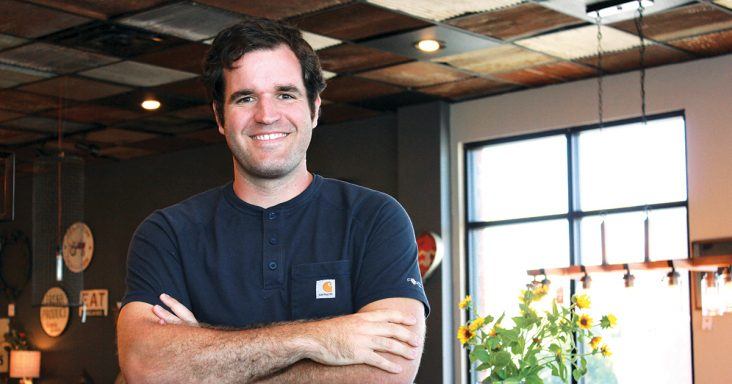James+James furniture sales jump nearly 32% over 2017
by July 18, 2018 2:06 pm 2,146 views

James Smith, co-owner of Springdale furniture retailer James+James.
James Smith backed into a career in the furniture business out of necessity. Nearly seven years later, it remains a runaway success.
Two months away from its seventh anniversary, Springdale furniture retailer James+James continues its impressive year-over-year growth.
Without sharing specific revenue figures, Smith said sales through the first half of the year are up 31.5% over the first half of 2017. Net profits are up more than 200%.
“Being a privately owned company, my co-owners aren’t on board with sharing specific [revenue] amounts,” Smith said. “But we’re thrilled with our continued year-over-year growth. It’s very difficult to post 30% growth in year seven, for sure.”
The Business Journal has previously reported the story of Smith’s success — out-of-work individual needs money, has an idea to make money, puts it into action and makes a living from it. Voila. A thriving company is born.
Smith earned a marketing degree from John Brown University in 2009 and did freelance video work for several months after that while trying to find a job.
By late summer of 2011, he was still trying to make ends meet when he had the idea to build and sell coffee tables. He spent about $150 on a Skilsaw, wood, sand paper and wood stain, and using design instructions from a how-to website, he built the items.
James+James eventually opened a brick-and-mortar store in a 2,800-square-foot space at 4217 S. Thompson St. in Springdale in August 2014. But the company is still primarily a web-based business, with orders taken over the telephone and shipped from its 7,800-square-foot warehouse and headquarters on West Randall Wobbe Lane in Springdale. The company is owned by Smith (50%) and two silent investors, who bought into the company in 2013.
James+James has cultivated a significant domestic following for its custom-made wood furniture made by hand, and 78% of company revenue comes from outside Northwest Arkansas. The company has 17 full-time employees, and carpenters build a variety of tables and dining room pieces, bedroom furniture, end tables, benches and bookshelves. About the only item the company doesn’t provide is chairs.
Residential customers account for about 89% of revenue, but Smith says new products are gaining more attention from commercial clients.
“We’ve launched several new products, namely hardwood office desks in November [2017], and we’re on track to sell over $250,000 in desks alone in the next 12 months,” he said.
Smith said Tyson Foods’ commitment to buying local landed James+James work for the company’s new offices in downtown Springdale, as well as the multiphase remodeling project of Tower I, a five-story, 90,400-square-foot building that’s one of the oldest buildings that make up Tyson Foods’ headquarters on Don Tyson Parkway.
Those jobs, Smith said, led to jobs for other Fortune 100 companies. Microsoft, for example, has purchased furniture from James+James for offices in Birmingham, Ala., and St. Louis.
Smith also credits larger profits to higher price point items and increased cart sizes.
“We’ve seen a decline in sales for our most affordable tables and an increase in sales for our more premium hardwood line,” he said. “Our average table purchase price has risen from $1,000 to $1,460 in the past three years. When we started in 2011, you really couldn’t buy a table online. Now we have competition from companies like Wayfair and Overstock. The shift has forced us to focus more on higher-end furniture and less on lower price point items.”
